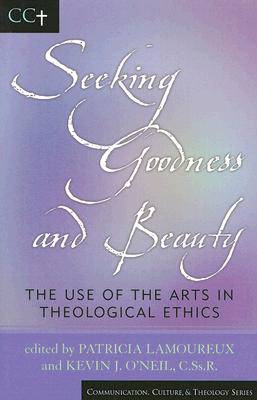
- Afhalen na 1 uur in een winkel met voorraad
- Gratis thuislevering in België vanaf € 30
- Ruim aanbod met 7 miljoen producten
- Afhalen na 1 uur in een winkel met voorraad
- Gratis thuislevering in België vanaf € 30
- Ruim aanbod met 7 miljoen producten
Zoeken
Seeking Goodness and Beauty
The Use of the Arts in Theological Ethics
€ 61,95
+ 123 punten
Omschrijving
How do we live the moral life? How can we become good and responsible parents, co-workers, and citizens? Essential to the task of becoming fully authentic persons and building genuine communities is seeking goodness and the presence of divine beauty in human experience and the created order. Seeking Goodness and Beauty: The Use of the Arts in Theological Ethics offers the reader a unique and innovative perspective on questions of ethics and how we can incorporate the human experience of the Arts to best live and teach the moral life. Art and aesthetic experiences transcend borders and engage us rationally, emotionally, and sensually. The arts are important for the moral life because they can serve as a locus of revelation. They can effect moral transformation and engage people's religious dimension in surprising ways. Novels, film, autobiography, and music can all contribute to the moral formation of good character and virtue as well as to the skill of discerning right action by developing imagination, shaping moral vision, tutoring the emotions, or guiding the process of moral discernment. As both scholars and teachers, the contributors to this volume not only offer keen insights into how the arts inform the moral life, but they also show how teaching theological ethics may benefit from the arts. Seeking Goodness and Beauty brings together theory and practice in an approachable, engaging manner and offers methods of pedagogy to encourage the use of the arts in moral education.
Specificaties
Betrokkenen
- Uitgeverij:
Inhoud
- Aantal bladzijden:
- 192
- Taal:
- Engels
- Reeks:
Eigenschappen
- Productcode (EAN):
- 9780742532106
- Verschijningsdatum:
- 17/01/2005
- Uitvoering:
- Paperback
- Formaat:
- Trade paperback (VS)
- Afmetingen:
- 169 mm x 226 mm
- Gewicht:
- 267 g

Alleen bij Standaard Boekhandel
+ 123 punten op je klantenkaart van Standaard Boekhandel
Beoordelingen
We publiceren alleen reviews die voldoen aan de voorwaarden voor reviews. Bekijk onze voorwaarden voor reviews.







